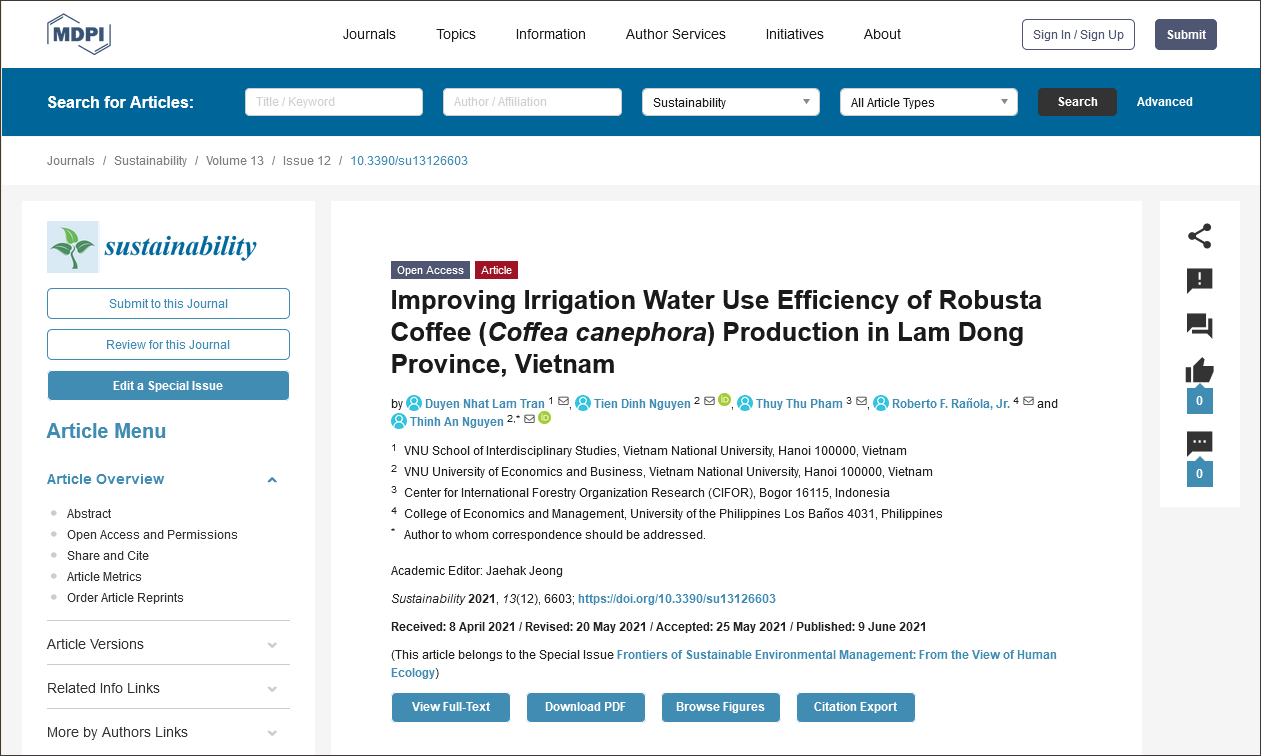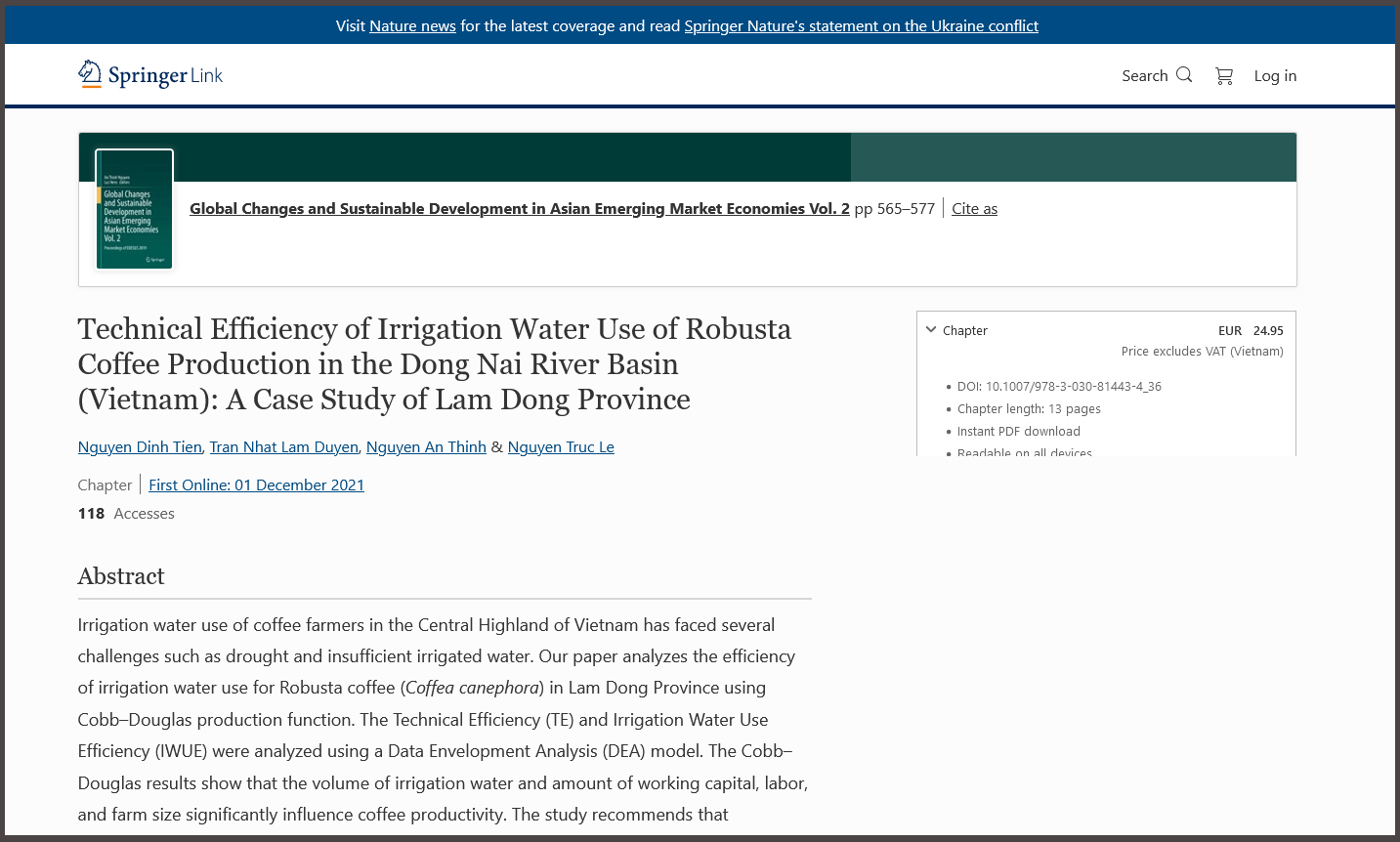Climate change has been and is one of the main issues around the globe, which countries are interested in promoting research. In Vietnam, climate change prevention and environmental protection has always been a prominent topic, identified by the Party and State as an important task.
In recent years, the drought condition and prolonged lack of water for irrigation have seriously affected coffee productivity in the Central Highlands, Vietnam. In order to find a solution to the above situation, Dr. Nguyen Dinh Tien - Head of the Department of Natural Resources and Real Estate Economics, Faculty of Development Economics, VNU-UEB, and colleagues have conducted researches related to the topic of efficient use of water. irrigated under conditions of prolonged drought. In particular, there are 2 studies published in prestigious international journals, including: "Improving the water use efficiency of Robusta coffee (Coffea canephora) in Lam Dong province, Vietnam" and “Technical efficiency of using water for irrigation of Robusta coffee production in Dong Nai river basin (Vietnam): A case study of Lam Dong province”.

Specifically, the article "Improving the efficiency of irrigation water use of Robusta coffee (Coffea canephora) in Lam Dong province, Vietnam" (2021) was published in Sustainability - an international academic journal, peer-reviewed and open access to human environmental, cultural, economic and social sustainability and published online monthly by MDPI Publishing
The content of the study analyzes the efficiency of using water for irrigation for Robusta coffee in Lam Dong province. The author uses the Cobb-Douglas production function to determine the change in coffee yield with respect to the application of irrigation water and other production factors, with data collected from 194 farmers, and the efficiency engineering (TE) and irrigation water use efficiency (IWUE) were analyzed using a data envelope analysis (DEA) model.
The correlation of various factors with IWUE was determined using Tobit regression model. The results from the Cobb-Douglas model show that the volume of irrigation water, the amount of working capital, labor and production scale significantly affect coffee yield. Indigenous people use irrigation water more efficiently than farmers migrating from other localities. Tobit results indicate that farmers' experience, education level, distance from farm to water source, security of access to water, access to credit significantly influence IWUE. New findings continue to suggest that mitigating water shortages in coffee farms requires sub-regional and national policy support such as better access to credit and extension services, create and manage household-level land to improve agriculture through the application of appropriate technologies and traditional knowledge.
At the Proceedings of the First International Conference on Economics, Development and Sustainability (EDESUS 2019) entitled "Global Changes and Sustainable Development in Asian Emerging Market Economies", the study "Technical efficiency of irrigation water use in Voi coffee production in Dong Nai river basin (Vietnam): A case study on Lam Dong province” by Dr. Nguyen Dinh Tien and colleagues analyzed the efficiency of irrigation water for Robusta coffee in Lam Dong province by using the Cobb-Douglas production function. Technical efficiency (TE) and irrigation water use efficiency (IWUE) were analyzed using a data envelope analysis (DEA) model. Cobb-Douglas results show that the volume of irrigation water and the amount of working capital, labor and production scale significantly affect coffee yield. The study recommends that preventing and mitigating water shortages on coffee farms requires more than just support from national policy (access to credit and extension services, training, management, etc.). land) but also need to improve household efforts in necessary farming activities.

Participating in the study were 3 co-authors from the University of Economics: Assoc. Prof. Dr. Nguyen Truc Le, Assoc. Nguyen An Thinh and Dr. Nguyen Dinh Tien, published in Proceedings of the First International Conference on Economics, Development and Sustainability (EDESUS 2019) and monograph at Springer Publishing House, article: Technical Efficiency of Irrigation Water Use of Robusta Coffee Production in the Dong Nai River Basin (Vietnam): A Case Study of Lam Dong Province | SpringerLink
The above two research papers have pointed out the direct effects of climate change and drought on coffee farms in Lam Dong province, Central Highlands, Vietnam. This is the basis for functional agencies and local authorities to come up with solutions to deal with drought and improve irrigation water sources, helping coffee farmers' lives to stabilize and develop their businesses.
About Dr. Nguyen Dinh Tien:
Dr. Nguyen Dinh Tien graduated with a bachelor's degree in Agricultural Economics from University of Agriculture 1 (now Vietnam Agricultural Academy) in 2001; earned the Master's degree in Agricultural Economics in 2009 from the National University of the Philippines, Los Banos; and the PhD in Agricultural Economics from the National University of the Philippines, Los Banos in 2017. His main research interests include: Environmental economic evaluation, payment for forest environmental services, climate change, sustainable development, market and price analysis, green growth. Dr. Nguyen Dinh Tien is currently the Head of the Department of Natural Resources and Real Estate Economics, Faculty of Development Economics, VNU University of Economics and Business. Up to now, Dr. Nguyen Dinh Tien is the author and co-author of 3 textbooks and monographs; 12 research papers published in international journals indexed in ISI (SCIE); 1 Scopus article and 15 articles in other international journals. |
>>> Click
here to view the article in Vietnamese